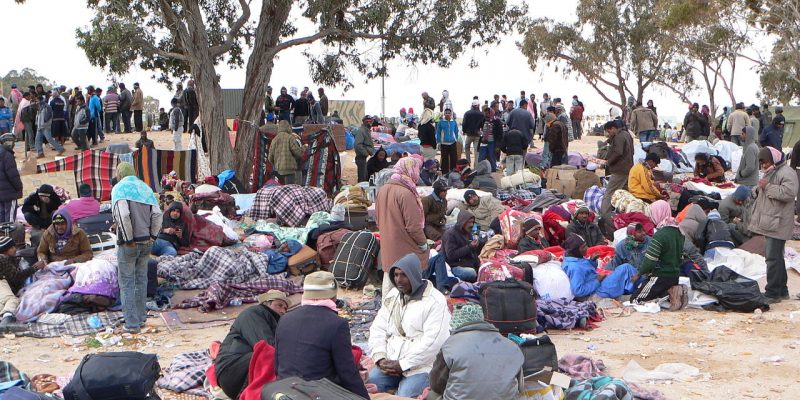1.The slave trade in Libya
The plight of migrants trapped in Libya, as a consequence of the EU and Italian strategies, can no longer be ignored. This report by CNN, documenting the existence of a full-blown slave trade, where migrants are being sold to the highest bidder, has prompted outraged reactions around the world.
2. United Nations denounce the situation in Libya
Last week also saw the condemnation by the UN Commissioner for Human Rights and the grave concerns by the UN Committee against torture (within the context of its examination of the situation in Italy). How can we look the other way in the face of such evidence?
This op-ed by Guma el-Gamaty in Middle East Eye calls out to Europe to stop using Libya as a dumping ground for unwanted migrants.
3. Libya is playing Battleship, endangering migrants’ lives
On November 6, as we told you, a rescue operation by German NGO Sea Watch was violently sabotaged by the Libyan Coast Guard. This tragic incident cost dozens of migrants their lives. Volunteer Gennaro Giudetti has been travelling Italy with his story, in the hope of raising awareness on what is happening in the Mediterranean. Watch his his speech before the Chamber of Deputies and his interview with Propaganda Live.
4. Death on the high seas
Meanwhile, there are still deaths out at sea. Dozen of lives are lost in the waters of the Mediterranean, a tragedy ignored by most.
Barbie Latza Nadeau wrote in Refugees Deeply about the daily drama of rescue operations at sea, among lives saved and lost without a hope. Meanwhile, in Salerno, a funeral service was held for the 26 Nigerian young women who died at sea last week (read this CNN report), with the entire city in mourning. A white rose was laid on very coffin, in remembrance of innocence lost – theirs, and ours.
5. A list is not enough
Last week we we shared the tragic list published by Berlin newspaper Der Tagesspiegel, that ran its front page with 33,293 names of the migrants who have died in the desperate attempt to reach Europe since 1993. That list, however, is not enough, because the number of border deaths is much higher. Read the article by Sarah Ruiz-Grossman in the Huffington Post.
The worst part is that the list of 33,000 dead migrants likely reflects less than half of those who have actually died trying to get to Europe in the last couple of decades https://t.co/rr8tuWuWvC (@sarah_grossman) #openmigration
— Open Migration (@open_migration) November 18, 2017
6. Integration on the dancefloor: Germany’s clubs for refugees
A new form of activism in Germany sees clubs at the heart of a community effort to welcome refugees. Because integration can happen on the dancefloor, even to the beat of techno music. Read Will Lynch’s article in Resident Advisor.
7. We must not forget Manus Island
We cannot say: out of sight, out of mind. Refugees (first detained offshore, then abandoned by the Australian government) are far away, but we have a duty to remember and write on them. Read two important reports from Manus Island, where the situation is spiralling out of control, amid fears of a cholera epidemic: Ben Doherty writing in the Guardian and Damian Cave writing in the New York Times.
8. Rohingya, why we are afraid to call this a genocide
There is very little doubt that what is happening in Myanmar is a full-scale genocide. The international community, however, is still in denial about it, and keeps referring to it as a “textbook case of ethnic cleansing”. The reason is quite clear: classing the atrocities committed against the Rohingya as genocide would create a moral obligation to intervene – something that world leaders are not willing to do. Doug Bock Clark’s in-depth story in Longreads is an absolute must-read.
There is a genocide going on right now in Myanmar, and we are not doing anything about it. Important read by @DougBockClark for @Longreads https://t.co/OyOM98XZoK
— CorallinaLopezCurzi (@corallinaLC) November 19, 2017
9. Voices of refugees from North Korea
There is another group of refugees that does not receive the attention it deserves: while the issue of North Korea is being debated more and more, it must be noted that the international community has been focusing exclusively on the nuclear threat from Pyongyang, with little or no attention given to Korean refugees (who are facing forced deportation from China, and possibly death). These rare and precious voices have been collected by Anna Fifield in a wonderful report for the Washington Post.
10. The if and when of technology for the global refugee crisis
What potential does technology help in providing innovative responses to humanitarian crises? We have asked this question before, with the op-ed by Lina Srivastava on civic tech for the refugee crisis and by Tin Geber on the need to rethink the hackathon approach; today we present some thoughts by Elizabeth Stuart for Bright Magazine on the possibilities, limits and dangers of social network activism.
Translation by Francesco Graziosi.
Header photo: refugees at the Tunisia-Libya border, via Wikimedia Commons.









